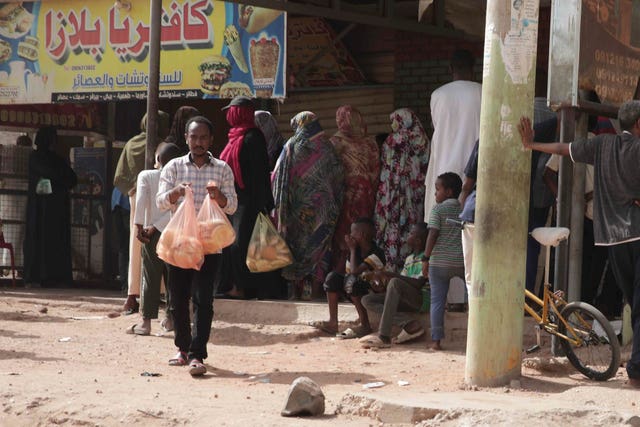The United States and Saudi Arabia have called on warring sides in Sudan to extend a ceasefire due to expire on Monday.
The Sudanese army and a rival paramilitary force, battling for control of Sudan since mid-April, had agreed last week to the week-long truce brokered by the US and the Saudis.
However, the ceasefire, like others before it, did not stop the fighting in the capital of Khartoum and elsewhere in the country.
In a joint statement early on Sunday, the US and Saudi Arabia called for an extension of the current truce, which expires at 9.45pm local time on Monday.
“While imperfect, an extension nonetheless will facilitate the delivery of urgently needed humanitarian assistance to the Sudanese people,” the statement said.
The statement also urged Sudan’s military government and the rival Rapid Support Forces (RSF) to continue negotiations.
In a separate statement, the US and Saudi Arabia accused both the military and the RSF of violating the ceasefire, saying that such violations “significantly impeded delivery of humanitarian assistance and restoration of essential services”.
The statement mentioned airstrikes by the military including one that reportedly killed at least two people on Saturday in Khartoum.
The RSF also continued to occupy civilian homes, private businesses, and public buildings, and loot some residences.
The fighting broke out in mid-April between the military and the powerful RSF. Both military chief Gen Abdel-Fattah Burhan and RSF leader Gen Mohammed Hamdan Dagalo led the 2021 coup that removed the Western-backed government of prime minister Abdalla Hamdok.

The fighting turned Khartoum and the adjacent city of Omdurman into a battleground. The clashes also spread elsewhere in the country, including the war-wracked Darfur region.
The conflict has killed hundreds of people, wounded thousands and pushed the country to near collapse. It forced more than 1.3 million out of their homes to safer areas inside Sudan, or to neighbouring nations.
Residents reported renewed sporadic clashes on Sunday in parts of Omdurman, where the army’s aircraft were seen flying over the city. Fighting was also reported in al-Fasher, the provincial capital of North Darfur.
The detention of Dr Alaa Eldin Awad Nogoud, a prominent surgeon and pro-democracy activist, in Omdurman caused uproar in the country, with medical and rights groups in and outside of Sudan demanding his release.
A group of armed men stormed Dr Nogoud’s home on Sunday and detained him, according to the Sudan Doctors’ Syndicate. He was taken to an unknown location, it said.
The Forces of Freedom and Change, the pro-democracy coalition, said the armed men claimed they were members of the military and the intelligence service. It said Dr Nogoud’s detention was part of a campaign targeting pro-democracy activists, and urged his immediate release.
The development came after Nogoud told a television station last week that the military seized medical aid provided by the World Health Organisation and stored it at a military hospital in Omdurman, according to local media.
He said doctors were denied access to the facility when they demanded a share in the aid to other hospitals. They were told that permission was needed first to get access, he said.
A spokesman for the military declined to comment on Sunday.
The US-Saudi statement came two days after Gen Burhan demanded in a letter to the UN secretary-general that the UN envoy to his country be removed.
UN chief Antonio Guterres was “shocked” by the letter, a spokesman said.
The envoy, Volker Perthes, has been a key mediator in Sudan, first during the country’s fitful attempts to transition to democracy and then during efforts to end the current fighting.
Gen Burhan’s letter came after Mr Perthes accused the warring parties of disregarding the laws of war by attacking homes, shops, places of worship and water and electricity installations.
In his briefing to the UN Security Council last week, Mr Perthes blamed the leaders of the military and the RSF for the war, saying they have chosen to “settle their unresolved conflict on the battlefield rather than at the table”.




Comments: Our rules
We want our comments to be a lively and valuable part of our community - a place where readers can debate and engage with the most important local issues. The ability to comment on our stories is a privilege, not a right, however, and that privilege may be withdrawn if it is abused or misused.
Please report any comments that break our rules.
Read the rules here